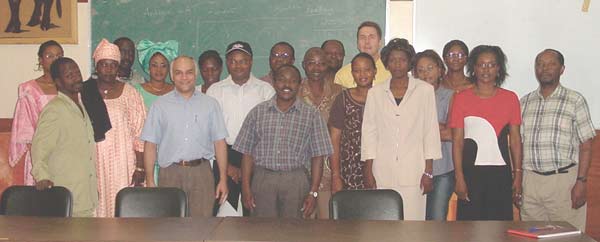


A training workshop on the diagnosis and monitoring of contagious bovine pleuropneumonia (CBPP) was held from 10 to 14 February 2003 at the Central Veterinary Laboratory in Bamako, Mali, in conjunction with the Joint FAO/International Atomic Energy Agency (IAEA) Division, Vienna. This was part of the activities of the FAO project, A Coordinated Programme to Strengthen Capacity for Epidemiosurveillance of CBPP in West Africa (TCP/RAF/0172), and the Joint FAO/IAEA project, Monitoring of Contagious Bovine Pleuropneumonia in Africa Using Enzyme Immunoassays (RAF/5/053).
The main objective of the joint workshop was to expose participants to theoretical and practical aspects of the laboratory diagnosis of CBPP as a support to overall surveillance activities and data collection on the prevalence of the disease |
The main objective of the joint workshop was to expose participants to theoretical and practical aspects of the laboratory diagnosis of CBPP as a support to overall surveillance activities and data collection on the prevalence of the disease. Key topics covered during the workshop were: sample collection, isolation and identification of Mycoplasma mycoides subsp. mycoides small colony variant (MmmSC), the complement fixation test (CFT), the latex agglutination test (LAT) for antigen and antibody detection, the dot blot test, and the competitive enzyme-linked immunosorbent assay (ELISA) test and its quality control. Participants from the eight countries (Burkina Faso, Côte d'Ivoire, Ghana, Guinea, Mali, Mauritania, the Niger and Senegal) involved in regional TCP project TCP/RAF/0172 attended the workshop.
|
Ten participants from IAEA member countries (Benin, Botswana, the Democratic Republic of the Congo, Kenya, Namibia, Nigeria, the Sudan, Uganda, the United Republic of Tanzania and Zambia) also attended the training workshop. Lectures were presented by Dr François Thiaucourt (CIRAD/EMVT, France) and Dr John Bashiruddin (Institute for Animal Health, Pirbright, the United Kingdom). Technical presentations on “Control of CBPP in Africa - the strategy of FAO” and “An overview of the activities of project TCP/RAF/0172” were given by the FAO/EMPRES Officer, William Amanfu. Dr Roland Geiger of the Joint FAO/IAEA Division made a series of presentations on basic considerations in the interpretation of laboratory tests for CBPP and in the quality control of serological tests with reference to the CFT and competitive ELISA (cELISA). The workshop identified the following factors as inhibiting effective laboratory support to the diagnosis of CBPP: inadequate practices in the isolation of MmmSC owing to the lack of reagents and the lack of sample submissions; and the variability of CFT reagents and cELISA reagents in some laboratories. Advantage was taken of the presence of representatives from Botswana, Zambia and Namibia to discuss prospects for the control of CBPP in Southern African Development Community (SADC) countries such as Namibia, Angola and Zambia, as well as the protection of CBPP-free countries, such as Botswana, from incursions of the disease.
Inaccurate diagnosis of CBPP is still an important constraint in many PACE countries and it has implications for the development of adequate control programmes and strategies.

Participants at CBPP diagnosis workshop in Bamako, Mali, 10-14 February 2003
Photo: Roland Geiger
Report by Roland Geiger, Joint FAO/IAEA Division, Vienna
The main objective of this Coordinated Research Programme (CRP) was to develop assays (cELISA and LATs) and to introduce, compare and validate them (cELISA, LAT and CFT) for the diagnosis of CBPP. The final Research Coordination Meeting of this programme was held from 17 to 21 February 2003 at the CVL in Bamako, Mali. The programme, which provided funding and scientific guidance to research contract holders, began in 1998 and involved 11 research contract holders from 11 countries of West, East and Southern Africa, and three research agreement holders. It was funded and implemented by the Joint FAO/IAEA Division. The LAT was developed in cooperation with the Moredun Research Institute of the United Kingdom, and the cELISA in cooperation with the International Cooperation Centre of Agricultural Research for Development, Department of Tropical and Veterinary Medicine (CIRAD/EMVT), France.
A previous meeting, which was convened by PACE and involved African countries faced with endemic CBPP, identified inadequate diagnostic tools and insufficient knowledge of the distribution and prevalence of the disease as the main constraints to the implementation of efficient CBPP control programmes. The principal achievements of the CRP are the identification and validation of such diagnostic tools (cELISA, CFT and LAT) and the development of testing strategies that overcome the constraints. In this respect, the programme was successful and it is anticipated that it will have a major impact on the establishment of national disease surveillance programmes aimed at controlling CBPP.
The cELISA was identified as a suitable and useful test |
The cELISA was identified as a suitable and useful test and one that could be submitted to the OIE Standards Commission to be considered as a prescribed test, along with the CFT. During the CRP, the test was introduced in all the participatory countries and is now operational. Full details on the conclusions and recommendations of the meeting can be downloaded from:
http://www.iaea.org/programmes/nafa/d3/crp/d32018-conclusions.pdf.